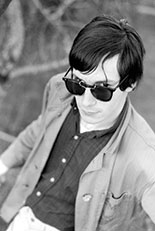George Kemp Schlesinger ’69

Photo by Michael Thompson ’65
George Kemp Schlesinger ’69, August 2013, in Maryland. After finishing his thesis at Reed, for which he earned a BA in philosophy, Kemp continued philosophy studies at the University of Oregon. He later lived in Yachats, where he produced a series of uniquely satirical collage books (unpublished) while studying computer programming. Another entertainment was music: Kemp began playing the flute at age 5 and mastered several other instruments, including saxophone, oboe, bassoon, piccolo, and piano. Terrel Brand ’67 says, “I met Kemp first in Sisson, where he collaborated with another roommate in a jazz group. His considerable skill and profound interest in music had a great influence on my own skill (modest) and interest (huge).” Those who loved him recall his quiet sense of humor, the outbursts of spontaneous silliness, the breadth of interests—in addition to playing music, Kemp played chess, Go, and mahjongg—and a gentleness of spirit. Cricket Parmalee ’67 remembered: “What is startling to me is how very specific my physical recollection of Kemp is. More than anyone else I have known, he was so individual in the way he looked, moved, and spoke. He was often very silent, but focused, and would then abruptly take the floor with a comment or commentary. His physical presence—kicking a pebble down the street, doing a little dance, like a soccer player, or breaking into a smile . . . forget Wittgenstein and think Buster Keaton!” Steven Halpern ’67 recalled Kemp as quiet and self-effacing, “yet always having something interesting to say, especially when pressed about one of his interests. His inner life, which I was convinced was rich, was, at the same time a complete unknown. I think of him as being the sweetest of human beings, with a sweetness that, unfortunately, he could not access for his own well being.” A move to Germany, as David Dod ’67 says, seemed to be the happiest and most fulfilling chapter of his life. “Having a job where he had talent and was valued, traveling to work with clients, and joining the municipal-sponsored town band of Heppenheim.” He had returned to the United States in 2005, after 20 years as a programmer at Software AG, one of the leaders in software application development. During his years in Germany, he traveled extensively for the firm, overseeing installations in various European countries and the U.S., aided by his facility for languages. In addition to fluency in English and German, he was comfortable in French, Italian, Dutch, and Hungarian, many of which he studied independently. In later years, he learned Chinese as an entertainment. Declining health led to Kemp’s return to Maryland, where he lived with his sister, Fran, who provided this memorial. Always able to amuse himself, Kemp was a film buff, particularly loving noir films of the ’30s and ’40s. He read extensively, everything from comics, to “trashy” Chinese novels, to history, philosophy, and economics. After a few years, retirement palled and he took part-time work at the local public library as supervisor of page services, solving logistical problems, developing systems, mentoring younger colleagues, and enjoying interactions with the youngest patrons. Kemp had a special kinship with children, sharing jokes and letters with nephews and nieces. His “uncleness” included great generosity of time, interest, and affection. Photographs of Kemp, taken by Mike Thompson ’66 during a day trip to Short Sands Beach, show the playful side of Kemp. “I remember him as a gentleman, quiet, and drawling his words out; happy to be included in outings and a good sport about putting up with photographers, but generally keeping himself in the background.” Kemp was kind to those he felt close to and, as one colleague at the public library noted, he was a dear sweet friend. “It is not often that you find someone who ‘gets’ you and Kemp was much loved and respected.” Kemp’s family held a memorial at the Harford County Public Library to commemorate his love of learning, his curiosity, and his humor that will remain with those whose lives he touched.
Appeared in Reed magazine: March 2014
comments powered by Disqus


![Photo of Prof. Marvin Levich [philosophy 1953–94]](https://www.reed.edu/reed-magazine/in-memoriam/assets/images/2022/LTL-levich1.jpg)
![Photo of President Paul E. Bragdon [1971–88]](https://www.reed.edu/reed-magazine/in-memoriam/assets/images/2020/Bragdon.jpg)
![Photo of Prof. Edward Barton Segel [history 1973–2011]](https://www.reed.edu/reed-magazine/in-memoriam/assets/images/2020/Segel.jpg)








































































